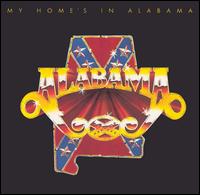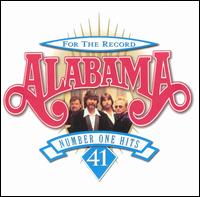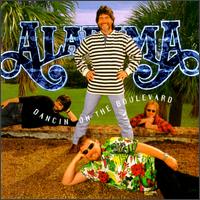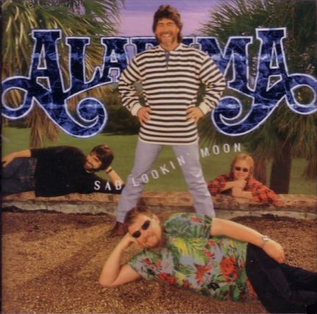Related Research Articles

Alabama is an American country music band formed in Fort Payne, Alabama, in 1969. The band was founded by Randy Owen and his cousin Teddy Gentry. They were soon joined by another cousin, Jeff Cook. First operating under the name Wildcountry, the group toured the Southeast bar circuit in the early 1970s, and began writing original songs. They changed their name to Alabama in 1977 and following the chart success of two singles, were approached by RCA Records for a recording deal.

My Home's in Alabama is the fourth studio album by American country music band Alabama, released in May 1980 on RCA Nashville, their breakthrough album. It peaked at No. 3 on the Country album charts and no. 71 on Billboard 200.

Greatest Hits Vol. II is the second compilation album by American country music band Alabama. The album was released by RCA Records in 1991, and has since been certified platinum for sales of 1 million units by the Recording Industry Association of America.

For the Record is a two-disc, 44-track greatest hits package released by the American country music band Alabama.

Greatest Hits Vol. III is the third greatest hits package released by the American country music band Alabama. The album was released by RCA Records in 1994, and has since been certified double platinum for sales of 2 million units by the Recording Industry Association of America.

The Essential Alabama was a compilation album that chronicled the music of the country music band Alabama. Issued as part of BMG International's "The Essential" series, the album was released in June 1998.
"I Wanna Come Over" is a song written by Richard Berardi and Michael Berardi, and performed by American country music band Alabama. It was first recorded by pop and rock singer Ronnie Spector in 1978 as the B-side of her cover of the Bonnie Tyler song "It's a Heartache". It was released in September 1979 as the first single to feature drummer Mark Herndon from the album My Home's in Alabama.
"Tennessee River" is a song written by Randy Owen, and recorded by American country music band Alabama, of which Owen is the lead vocalist. It was recorded in April 1980 as the third single from the album My Home's in Alabama. The song was the group's first No. 1 song on the Billboard magazine Hot Country Singles chart.

"Why Lady Why" is a song written by Teddy Gentry and Rick Scott, and recorded by American country music band Alabama. It was released in August 1980 as the fourth and final single from the album My Home's in Alabama. The song was the group's second No. 1 song on the Billboard magazine Hot Country Singles chart.

"Mountain Music" is a song written by Randy Owen, and recorded by American country music band Alabama. It was released in January 1982 as the lead-off single and title track to Alabama's album Mountain Music.

Mountain Music is the sixth studio album by American country music group Alabama, released in 1982. A crossover success, it ranked well as an album on both country and pop charts and launched singles that were successful in several markets. This is Alabama's most successful studio album. In 1998, the album was certified 5× Platinum by the Recording Industry Association of America. It peaked at No. 1 on the Billboard Country Albums chart and No.14 on the Billboard 200.

Feels So Right is the fifth studio album by American country music band Alabama, released in February 1981 by RCA Nashville. It was their first #1 on the Billboard Top Country Albums chart. On the all-genre Billboard 200 the album peaked at #16 and stayed for more than three years, longer than any other Alabama album.

The Closer You Get... is the seventh studio album by American country music band Alabama, released in 1983. All three singles from this album — "The Closer You Get", "Lady Down on Love" and "Dixieland Delight" — reached Number One on the Hot Country Songs charts in 1983. "She Put the Sad in All His Songs" was also recorded by Ronnie Dunn and was released by him as a single in 1983. The album itself reached No. 10 on the Billboard 200, becoming the band's highest-charting album. Considered a stylistic move towards a more pop-friendly sound, the album has been described as a mix of "easy listening" country pop and neotraditional country by AllMusic's Vik Iyengar.

40-Hour Week is the ninth studio album from American country music band Alabama. Released in 1985, the album included three songs that topped the Billboard magazine Hot Country Singles chart and continued the band's dominance during the 1980s. The album peaked at number one on the Billboard Country Albums chart and number 28 on the Billboard 200.

Just Us is the eleventh studio album by American country music band Alabama, released in 1987. As with most of their albums, the band co-produced with Harold Shedd. The album charted at number 1 on Billboard Top Country Albums, and accounted for three singles. It also charted at number 55 on the Billboard 200.

Alabama Live is the first live album by the American band Alabama. Their first live compilation, it was released in 1988 and was a Number One album on Top Country Albums. The album includes live renditions of various singles from the band's career, as well as the album tracks "Red River", "Fireworks" and "Gonna Have a Party". Also included is a cover of the Marshall Tucker Band's "Can't You See", which Alabama had never included on any of their studio albums.

Cheap Seats is the fifteenth studio album by the American country music band Alabama, released in 1993 by RCA Records. It produced the singles "Reckless", "T.L.C. A.S.A.P." and the title track. Of these, "Reckless" was the band's final Number One hit on the Billboard country charts until 2011's "Old Alabama", and "The Cheap Seats" was the band's first single in fourteen years to miss Top Ten of the charts. Alabama produced the album along with Josh Leo and Larry Michael Lee, except for "Angels Among Us", which bassist Teddy Gentry produced.

Dancin' on the Boulevard is the seventeenth studio album by American country music band Alabama, released in 1997 by RCA Records. It includes the singles "Dancin, Shaggin' on the Boulevard", "Sad Lookin' Moon," "She's Got That Look in Her Eyes" and "Of Course I'm Alright". Also included on the album are cover versions of The Temptations' "My Girl" and Bruce Channel's "Hey! Baby". The album peaked at No. 5 on Billboard Country Albums Chart and No. 55 on Billboard 200.
James Harold Shedd is a music industry executive and producer, best known for his role as producer of the country group Alabama as well as Reba McEntire, Shania Twain and Toby Keith. During his career he has headed Mercury Records and Mercury's sister label, Polydor.

"Sad Lookin' Moon" is a song written by Randy Owen, Teddy Gentry and Greg Fowler, and recorded by American country music group Alabama. It was released in February 1997 as the lead-off single from the album Dancin' on the Boulevard. It peaked at number 2 in the United States, while it was a number-one hit in Canada.
References
- ↑ "Alabama: My Home's In Alabama". Allmusic . 2007-06-18.
- ↑ 2000 State Senate bill SR 458 to change State Song Archived 2006-04-06 at the Wayback Machine
- ↑ Morris, Edward, "Alabama," Contemporary Books Inc., Chicago, 1985 ( ISBN 0809253062)
- ↑ "Alabama Chart History (Hot Country Songs)". Billboard.